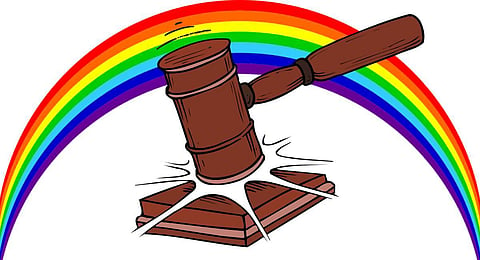

NEW DELHI: The Supreme Court will deliver on Tuesday its judgement on pleas seeking legal recognition of same-sex marriages in India.
On May 11, after an extensive 10-day-long hearing, a Constitution bench led by the Chief Justice of India (CJI) DY Chandrachud and comprising Justices Sanjay Kishan Kaul, S Ravindra Bhat, Hima Kohli, and PS Narasimha had reserved their verdict.
The top court's judgement will decide as to whether the words 'man' and 'woman' can be replaced with the word person and the words 'husband' and 'wife' can be replaced with the word 'spouse' in the Special Marriage Act (SMA).
The bench had also said that the very notion of a man and a woman, as referred to in the Special Marriage Act, is not "an absolute based on genitals".
Some of the petitioners had urged the apex court to use its plenary power, "prestige and moral authority" to push the society to acknowledge such a union which would ensure LGBTQIA++ people to lead a "dignified" life like heterosexuals. LGBTQIA++ stands for lesbian, gay, bisexual, transgender, queer, questioning, intersex, pansexual, two-spirit, asexual, and ally persons.
Notably on the first day of the hearing, the bench had defined the contours of the pleas and had said that it would not go into personal laws governing marriage and instead will look into the issue of registration of same-sex marriages under the Special Marriage Act.
Another significant development which took place during the hearing was willingness to consider if certain rights could be conferred upon same-sex couples short of legal recognition as marriage.
While hearing the matter on May 11, the bench had observed it cannot give a declaration on same-sex unions on the anticipation as to how Parliament is likely to respond to it.
OPINION | The jurisprudence of same-sex marriage
Meanwhile, the petitioners in their rejoinder submission on Thursday last week submitted that they were not seeking the interpretation of every gendered word in the SMA in a gender-neutral way. They said they were only assailing those parts of the SMA that require a Constitution-compliant reading on grounds of discrimination.
Senior advocate Abhishek Manu Singhvi said that the state by excluding same-sex couples from civil marriage was declaring that it is legitimate to differentiate between their commitments and the commitments of heterosexual couples.
“When it comes to the use of gendered terms to specifically address gendered imbalances of power and therefore achieve substantive equality, limiting such terms to their gendered, heterosexual context is what is consistent with the law’s underlying thrust. Civil union is not a solution, not an equal alternative. Civil unions do not address the constitutional anomaly presented by exclusion of non-heterosexual couples from the institution of marriage,” Singhvi said.
Senior Advocate Raju Ramachandran said that lack of recognition leads to the denial of equal protection under the law.
Meanwhile, while underlining the real question before the top court, which is “who would take a call on what constitutes a valid marriage and between whom”, Solicitor General Tushar Mehta had said that the Parliament was aware of the concept of gays and lesbians even while the Special Marriage Act was promulgated in 1954 but there has been a “conscious omission” to not recognise same-sex marriages.
Arguments were also made by Senior advocates KV Vishwanathan, Anand Grover, Geeta Luthra, Maneka Guruswamy, and advocates Karuna Nundy, and Vrinda Grover.
During the arguments, the Centre had told the apex court that any constitutional declaration made by it on the petitions seeking legal validation for same-sex marriage may not be a "correct course of action" as the court will not be able to foresee, envisage, comprehend and deal with its fallout.
The Centre's stand has been that the issue of legal recognition of same-sex marriages through the SMA should be left for the Parliament to decide since it is the appropriate forum to conceive several situations which would arise from recognising the same “legally.”
The Centre had also told the top court that the governments of Rajasthan, Andhra Pradesh and Assam had opposed the petitioners' contention seeking legal endorsement for such wedlock.
Stressing on the fact that all the civil as well as criminal laws define “man and woman in conventional sense”, the Centre had submitted that the right to marry does not include the right to compel the state to create a new definition of 'marriage'.
On May 3, the Centre had told the court it will constitute a committee headed by the cabinet secretary to examine the administrative steps that could be taken for addressing "genuine humane concerns" of same-sex couples without going into the issue of legalising their marriage.
The Centre's submission was pursuant to the apex court asking it on April 27 whether social welfare benefits like opening joint bank accounts, nominating life partner in provident funds, gratuity and pension schemes can be extended to same-sex couples without going into the issue of legal sanction to their marriage.
(With additional inputs from PTI)